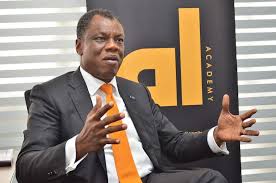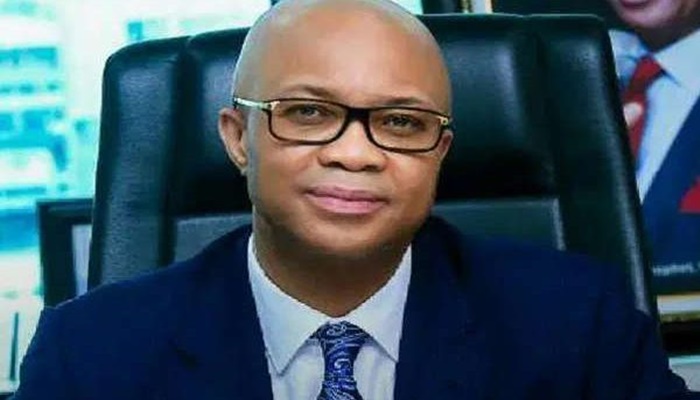

By Sanya Ademiluyi
Godwin Emefiele governor of Nigeria’s Central Bank, CBN is a man on the spot. Having taken on the economic activist role in recent times ,the CBN governor may also neatly fit into a monetary policy hawk’s description.
Needless to say, his economic activism has also led him to take on fiscal policy as part of his unlikely purview .Yet all that monetary and economic pantomime may be unravelling as the national currency, the naira, appeared to have been in free fall in the parallel market,in recent weeks following two months of growing forex shortages.
It was only onThursday, August 27,that the CBN announced that it would sell forex to Bureaux de change ,BDCs, from next Monday, August 31,2020.Howbeit,the bank said the BDCs are not to sell the naira higher than N380 to the US dollar, whereas the naira was already close to N500/US dollar on that market. Even if, the expected forex sale by the CBN would cool the markets somewhat ,it is unlikely to return the market exchange rate to pre-scarcity level of N380/$,observers believe.
The sale appears to have been timed to coincide with the resumption of international flights by the country’ airports. The CBN said travelers would be able to purchase basic travelling allowance, BTA for their trips. Last week, however aviation authorities pushed back scheduled flight resumption date from August 29 to September 4
In May, Emefiele promised to provide forex to stranded foreign portfolio investors, who were eager to return their funds home, after a covid-19 lockdown shuttered previously ‘under-performing’ capital markets. The CBN governor who pointedly addressed these foreign investors, asked them to be patient while he worked at providing them with enough foreign exchange to repatriate their funds –if they so wish. But so far, that has not happened.
It is not known how much these portfolio investors are worth in the Nigerian market. The low point would be $2 billion say some analysts. But Emefiele has not being able to keep his promise for several months now, since after the lockdown was eased late May—three months ago. According to the Nigerian stock Exchange ,NSE, Portfolio Investors accounted for roughly 43 per cent of transactions of the stock exchange worth N56.3 billion in June, whereas in March, the foreign portfolio dealings on the exchange was worth N110.22 billion. In march inflow of foreign capital was N22.4 billion, while outflows were a huge N87.7 billion. In June, foreign inflows was N25.2 billion while outflows was N31.07 billion,according to NSE figures.
Last month, July, capital inflows to the stock market reduced further to N13.7 billion while outflows was N20.9 billion, which is a net outflow of N7 billion.
Nigeria got $3.5 billion facility from the World Bank in the wake of covid-19 drawing down completely its reserves with the World bank. That was promptly shared by all tiers of government in the country,with heavy debt repayment obligations to commercial and bilateral lenders and heavy capital and overhead costs,the Buhari administration and the CBN soon found itself rationing foreign exchange to government and commercial banks.
Meanwhile, the exchange of the naira against all currencies began to depreciate badly. Despite attempts by Emefiele to close the alarming gaps in multiple exchange rates in June, the gap has widened once again to a scandalous N100 between the official markets and the streets.! This can be taken on the strength of forex supply shortages.
An obviously embarrassed Emefiele has however put up a brave face.
Curiously, the CBN is also battling those who brought in goods and raw materials from abroad from their own independent forex sources. About 65 companies and individuals have been charged to court by the CBN, which interestingly, accused them of “money laundering”, among other such charges.
An embattled Emefiele and his team have also been wrong on the fate of the country’s economy following the covid-19 lock-down .Latest economic figures released by the National Bureau of Statistics recorded a staggering 6.1 per cent drop on economic drop in the second quarter of the year ended June,2020. Whereas, Emefiele and his team were tooting a much lower 2 per cent based howbeit, on several improbables.
The World Bank which has earlier forecast a drop in economic growth of slightly over 2 per cent in March, later reviewed upward its projection to about 5 per cent.
Emefiele who promised (along with Finance and Budget Planning Minister, Zainab Ahmed) in May, to merge the multiple naira exchange rates into one ,has ,so far, failed to do so, despite what may be considered, several feeble attempts.
His avowed no depreciation position has given way to a swashbuckling approach. Making no more pretenses to hold aloof the naira, the CBN itself has began selling British pounds sterling at N500 to one pound sterling! Something considered unthinkable few months ago. In the past four weeks ,Emefiele has also adjusted the naira exchange rate downwards a number of times.
First, was in late May, when he moved the naira rate from the semi-fixed official rate of N306/$ to N360.Then,the CBN governor described it at “an adjustment” and not a devaluation.Last week,he moved the naira exchange needle again,from N379 to N386.This was perhaps, in a bid to pace up to the parallel market were the gap in exchange rate had widened to close to N100 to the US dollar between the two markets! Ironically, it would appear the CBN governor is taking his cue of where the naira exchange should be, from the parallel market. A market which typically, CBN governors including Emefiele, have treated in a condescending manner, if not with scorn.
After an unlikely rally by end of May, the naira exchange rate against international currencies has fallen consistently to date — on the heel of forex scarcity.
Emefiele’s new angle has been to blame exporters who have “refused’ to repatriate their foreign exchange earnings to swell the pool at home for its forex straits.Early this week an obviously angry Emefiele ordered commercial banks to furnish him with the account details including BVN of these recalcitrant exporters who appear to be the new whipping boys for an apparently bigger problem of forex shortages.
CBN officially devalued the naira as it quoted the rate from N306/US$1 to N360/US$1,August 10,then it again moved the needle to N379/US$ last week. moves that rankled the market. But the naira had been depreciating alarming on the streets. Dropping to an unimaginable N470/US$ last week.
The country’s forex buffer may have disappeared in July, after the Buhari administration collected a $3.5 billion credit from the World Bank, which was actually all of the country’s forex savings domiciled with the bank. The World Bank disbursed the $3.47 billion facility to Nigeria on July 30,2020, although approval had been given by the World Bank board in June. Although the country’s financial markets reacted positively to the news of that credit approval in June ,things have since turned for the worse, as the expected impact of increased liquidity in the forex market has been dashed.
At a Lagos Business School monthly breakfast meeting ,few weeks ago ,leading monetary economist, Bismarck Rewane noted that the CBN has intensified foreign exchange rationing in its bid to preserve the nation’s external reserves, which fell to $35.678 billion on Thursday August 6th from $35.877 billion on Thursday, July 30th, translating to $199 million week-on-week decline. He said further that: “Shortage of forex is increasing demand at other markets, especially at the parallel market. Corporates were receiving approximately 15 percent of their demand for dollars ,while the balance of 85 percent is being sourced from the parallel market and non-deliverable forwards market.”
Rewane forecasts that the multiple exchange rate regime will persist till 2021,in spite of Emefiele’s efforts- given the number of odds the CBN has to contend with along the way.He also believes that the nation’s foreign reserves will decline further to $34 billion by the end of August.
From July to date ,prices of local consumables have jumped by 15 to 25 per cent, as a result of the naira’s continuing woes against international currencies. Right now,the markets are poised to see if Emefiele will make good his promise to sell forex to Bureaux de change next week.










